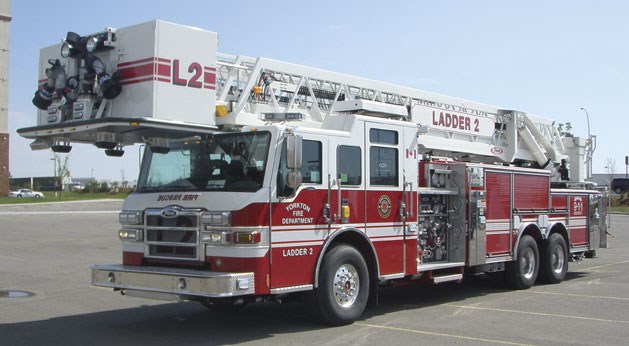The heart of the Fire Protective Services Operational Review came down to how best to hit industry targets in terms of responses.
At present 12 per cent of call-outs in Yorkton are fire calls, while other areas of response include 28 per cent false alarms, 27 per cent hazardous conditions such as spills, or electric wires down, and 22 per cent emergency rescues, such as motor vehicle accidents.
Steve Thurlow, with Dillon Consulting who compiled the Review noted a primary goal is to be able to put 14 fire-fighters on-site of a fire within nine minutes of receiving the call 90 per cent of the time, or as a secondary goal to have 10 firefighters on scene within 10 minutes 80 per cent of the time.
In Yorkton both response targets are just more than 32 minutes.
Thurlow said the greatest impediment to hiding either target is the size of the firefighter pool in the city. While four are on shift at the Fire Hall, to achieve targets of 10, or 14 on site, additional firefighters must be called into work and that takes time and the overall pool is so small finding the numbers to call in can be a challenge.
Councillor James Wilson wanted to know the biggest impediment to hitting the targets.
“The pool of firefighters you have available,” said Thurlow, noting to have 14 on site basically requires the entire local force.
Thurlow explained the five options put forward in the Review for Council to consider all look to grow the overall pool of firefighters.
Such moves would allow an “interior attack (on a fire) sooner than you can today,” offered Thurlow.
However, in some of the options there would be increased utilization of auxiliary force members, or volunteers paid on call, which at present would run counter to the collective agreement the City have with its professional firefighters.
“The collective agreement would be a major challenge to implementation,” said Thurlow.
Coun. Chris Wyatt said he was disappointed the options did not go farther in terms of utilizing paid of call firefighters. He said he wanted to see a force with three fire chiefs overseeing a paid on call staff, suggesting such a force would be $1.2 million annually, money which could be then targeted at projects such a revitalizing Broadway Street, or another “30 projects at well over a million dollars (each).”
Neal Matechuk, president of IAFF Local 1527 Yorkton Professional Firefighters said the review is not the only one which has been undertaken in recent years, but added the latest is a document the local is willing to sit down at a round table to discuss.
“Let this report become a guideline,” he encouraged, suggesting working together was the best way of “putting the citizens of the city first …
“Let’s get back to some round table meetings … We’ve accomplished a lot of things together … Let’s fix the manning problem.”
Coun. Wilson wanted to know what temporary firefighters and auxiliary firefighters can do.
Matechuk said they can, if trained to the standards, do what a full time firefighter can do in terms of that training. However, locally a past arbitrator gave the union a ‘no contracting out’ clause in the collective agreement, he said, noting that was done under the constant threat at the time of the City to move to a volunteer force.
It was the same arbitrator which opened the door for the City to use a temporary firefighter, added Matechuk.
Coun. Randy Goulden said other communities, such as Swift Current, North Battleford, Cochrane, AB, and Portage la Prairie use Paid On Call firefighters.
Matechuk said under the current collective agreement that would not work locally.
“But, I’m not going to say it’s not an option,” he added.
Matechuk said the key to such an option would be contractual assurances for the current 16 full time professional firefighters.
“That’s the gist of it,” he told Yorkton This Week. He said as long as it did not jeopardize the full time staff they would be willing to look at options to creating a bigger pool of firefighters in the city to draw from in times of fires.
Asked after the meeting which of five options outlined in the Review the Union favoured, Matechuk said he was not in a position to detail that, but reiterated sitting down with the City and working on a united plan was the best way to go about change.



